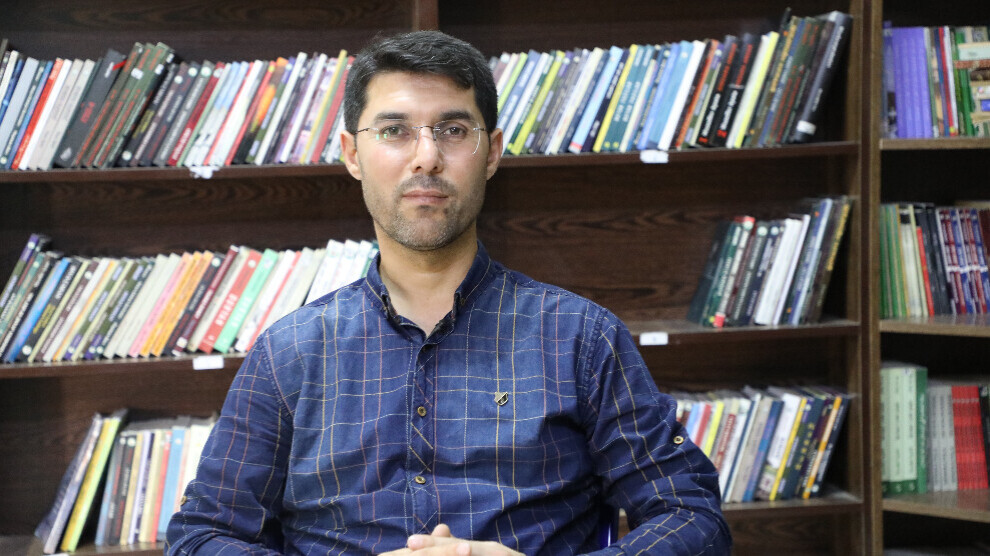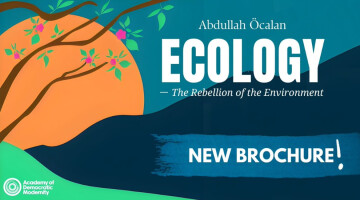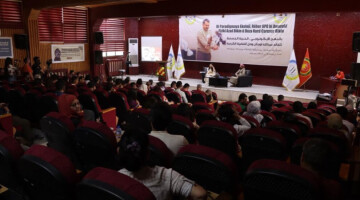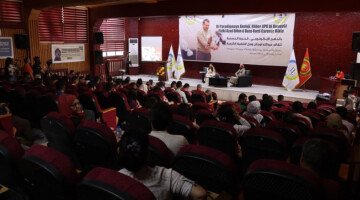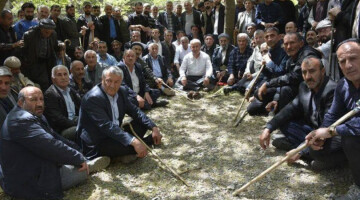The Autonomous Administration of Northern and Eastern Syria is under attack on many levels simultaneously. While, on the one hand, a massive policy of displacement is taking place and the demographics of the region are being actively reshaped in the Turkish-occupied regions, the Turkish state is using its control over the rivers to dry up or flood the region. Added to this are the worsening conditions due to man-made climate change.
Despite all the difficulties, the Rojava Revolution made the construction of an ecological society one of its cornerstones. However, creating ecological awareness under wartime conditions proves difficult. The first ecology conference of North and East Syria took place in Qamishlo in the past weeks.
In this ANF interview, Ibrahim Esed commented on the fight for an ecological life in Northern and Eastern Syria and the implementation of the goals of the ecology conference.
Could you tell us about the pursuit of ecological approaches in Northern and Eastern Syria since the beginning of the revolution?
We can divide the work of the Ecology Council formed by the Democratic Autonomous Administration of Northern and Eastern Syria, or the institutionalization of ecological work, into two phases: before the revolution and after the revolution. The period after the revolution can also be divided into a phase before the formation of the Ecology Council and after that. If you look at the politics of the regional states, there are different developments in the different parts of Kurdistan. Even though it had the same attitude and mentality, the Ba’athist regime implemented its policies in a slightly different way. The economic and social policies developed by the Ba'athist regime were very subtle. The people in the region were deprived of the opportunity to support themselves with their land. This would create economic pressure on people.
This pressure was intended to create migration pressure from the Kurdish regions and ensure that the Kurdish population migrates to major cities and disperses. On the other hand, there was massive mistreatment of nature in Rojava. Since the people of Rojava were constantly preoccupied with economic problems, they were hardly able to perceive the destruction of nature and develop a counter-attitude. One can even say that the people of Rojava were not even aware of the destruction of their own nature. This policy was carried out by the Ba'athist regime in a very subtle and dirty way. The Ba'athist regime had turned the Cizîrê and Afrin regions into its own economic centers. The people who lived in these regions were forced to sell the products they grew for their livelihood very cheaply. The revenue from the mineral resources of these regions also went to the Ba'athist regime, and the people of the region did not benefit from these resources. In addition, there was no respect of nature in society. This situation continues to this day. Perhaps there is a connection to one's own land, but this is too weak to protect it through ecological awareness. Such an attitude is missing not only in society but also among those who call themselves intellectuals.
The 19 July Revolution [2012] had a strong impact on all areas of life. Social life changed profoundly. People's way of life, their family relationships, their relationship with nature and the organization of their lives are affected. To view the 19 July revolution exclusively as a political revolution would be very limiting. While important steps have been taken in some dimensions, some other levels remain underdeveloped due to the ongoing war and attacks by Turkey.
With the establishment of the Autonomous Administration, an attempt was made to develop an ecological life. The war delayed the necessary steps to be taken in this regard, inevitably. The Ecology Committee worked within the community framework. With the announcement of the Social Contract, an autonomous ecology committee was created. The committee was primarily oriented towards preserving the ecological work that had been done to date. For this reason, it lacked a paradigmatic dimension.
The Turkish state's attacks on Northern and Eastern Syria, particularly the occupation of Afrin, Serêkaniyê and Girê Spî, and the destruction of nature there have caused serious damage. Work began last year to identify the extent of this damage and carry out appropriate repair work. It was important to introduce the concept of ecology into society and raise awareness of it. Over the last year, the Ecology Committee has become increasingly recognized both in society and in general institutions.
You recently organized an ecology conference in Northern and Eastern Syria. It was the first of its kind. What principles was this conference based on?
As an ecology committee, we have developed some plans. The Committee, the Ecology Council and the Ecology Academy have begun to work on this basis. The Ecology Committee and the Ecology Academy are active. Our work to establish the Ecology Council continues. The draft statutes for the council are ready. It is within our one-year target.
One of the tasks we set ourselves was to organize the ecology conference. It took place on 26 and 27 April. Many ecology activists and academics from different countries attended it. It was a conference at which current work was evaluated and perspectives were discussed. The conference has achieved its goal.
What was the main theme of your conference?
We joined the initiative for the liberation of Rêber Apo [Abdullah Öcalan] and adopted the following slogan: “We want to liberate Rêber Apo and solve the Kurdish question on the basis of the ecological paradigm.” All analysis and messages had this slogan as a base. Today, not only Northern and Eastern Syria, but the entire world is experiencing a serious ecological crisis. Rêber Apo has developed alternative solutions for all of these crises and offers perspectives for global problems with his democratic and ecological philosophy. But he is in total isolation. Through the conference we have once again tried to demonstrate this reality to the world. In this sense, all seminars were organized on the basis of the model of the democratic nation. Discussions were held about how the ecological paradigm could offer an alternative to the environmental deadlock created by the prevailing system. This alternative has come to life in Northern and Eastern Syria.
The second theme of the conference was identifying and overcoming the shortcomings in the implementation of the ecological paradigm in Northern and Eastern Syria. In addition, seminars and discussions were held in the areas of Women's Academy, Jineolojî, Economy, Rojava Faculty, City Administration, Health and Rojava Reforestation and defense of nature. In this way, we tried to show society that ecology permeates all areas of life and that every institution is directly linked to it.
What were the main agenda items of the conference?
The two-day conference was held under two main themes. On the first day, democratic modernity was discussed from its emergence to resistance. The seminars by foreign scientists also took place in this context. On the second day, the conference looked at how environmental and social destruction takes place in a Kurdistan context. In this context, northern and eastern Syria as well as northern Kurdistan, southern Kurdistan and eastern Kurdistan were discussed.
A results paper was then written. The final declaration was presented to the conference delegates and the academics from abroad, activists and professors who attended the conference as guests. All institutions, organizations, non-governmental organizations, parties and environmental activists from Northern and Eastern Syria took part in the conference at delegate level. Due to the increasing attacks by the Turkish state on our region, many people from abroad who wanted to take part in the conference were unable to travel. Therefore, they took part in the conference online. With this in mind, the final declaration was prepared with the joint participation and consent of all conference delegates and guests. The final declaration consisted of 21 articles. The basic principle is to condemn the isolation of Rêber Apo imposed by the Turkish state, to create ecological urban models against the unplanned, polluting and carcinogenic urbanization, to eliminate the separation between cities and villages and, above all, the attitude and practice that the villages are in service of cities to put an end to it and to create a system in which villages and cities complement each other.
Rojava has been subject to fierce attacks for years. Both the infrastructure and the environment were massively destroyed. The Turkish state in particular has heavily attacked this region. What initiatives will you take against this?
The Turkish state is systematically carrying out a campaign of destruction against society and the environment in Northern and Eastern Syria. Both the Turkish state and the government in Damascus attack the model of self-government on a daily basis. These attacks are diverse and target every aspect of life. The government in Damascus uses many different attack methods in the region, including the distribution of drugs. The self-government defends itself against these attacks every day with all its institutions. We as the Ecology Committee are also working against this. It is important for us to protect nature in all its dimensions.
On the other hand, tests and analysis are carried out daily on the water of the Euphrates to assess the threat of cyanide in the water following a mine explosion in Turkey. Furthermore, the fight against drought continues. It was decided to hold a global ecology conference every year promoted by the Ecology Council of Northern and Eastern Syria. After the conference we created an ecology platform.
Will you also work to increase environmental awareness among the population?
Currently, our society has achieved awareness of keeping cities clean and protecting them. However, that alone does not constitute ecological awareness. It is therefore still necessary to create such awareness in society. This is the basis of our long-term strategy. We continue our efforts to spread ecological culture and understanding using the means at our disposal. We have an academy for this. In this academy we want to carry out ecological work based on the paradigm of the democratic nation. We continue to work against all environmentally destructive activities and activities, both in our own region, in the Middle East and in the world. There is a draft that we have prepared to create and protect the legal dimension of ecology which has been submitted to the legal institutions. According to this draft, all institutions and organizations within the self-government are based on living in harmony with ecology. The self-government system is already based on the ecological paradigm. On this basis, we will continue our efforts to develop sensitivity and responsibility among the population.

